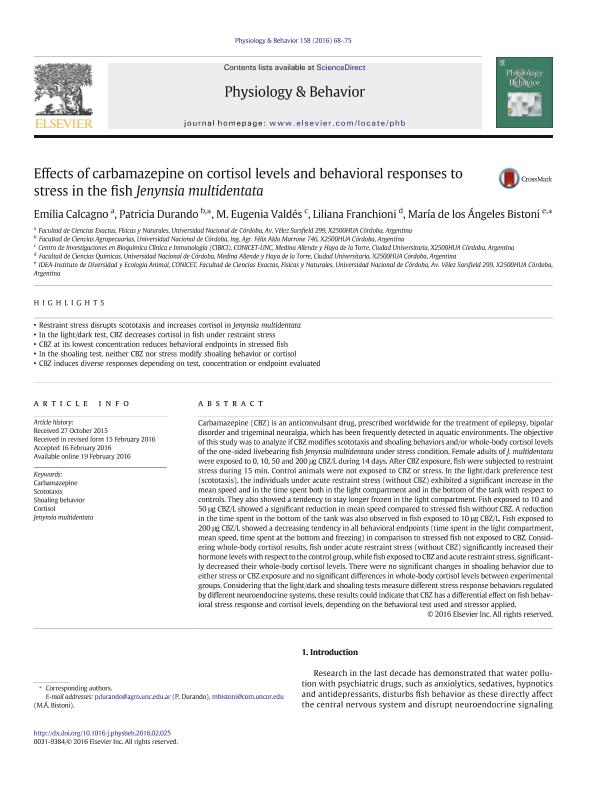Mostrar el registro sencillo del ítem
dc.contributor.author
Calcagno, Emilia

dc.contributor.author
Durando, Patricia Evelina

dc.contributor.author
Valdés, María Eugenia

dc.contributor.author
Franchioni, Liliana
dc.contributor.author
Bistoni, Maria de Los Angeles

dc.date.available
2018-05-30T18:32:19Z
dc.date.issued
2016-05
dc.identifier.citation
Calcagno, Emilia; Durando, Patricia Evelina; Valdés, María Eugenia; Franchioni, Liliana; Bistoni, Maria de Los Angeles; Effects of carbamazepine on cortisol levels and behavioral responses to stress in the fish Jenynsia multidentata; Pergamon-Elsevier Science Ltd; Physiology And Behavior; 158; 5-2016; 68-75
dc.identifier.issn
0031-9384
dc.identifier.uri
http://hdl.handle.net/11336/46686
dc.description.abstract
Carbamazepine (CBZ) is an anticonvulsant drug, prescribed worldwide for the treatment of epilepsy, bipolardisorder and trigeminal neuralgia, which has been frequently detected in aquatic environments. The objectiveof this study was to analyze if CBZ modifies scototaxis and shoaling behaviors and/or whole-body cortisol levelsof the one-sided livebearing fish Jenynsia multidentata under stress condition. Female adults of J. multidentatawere exposed to 0, 10, 50 and 200 μg CBZ/L during 14 days. After CBZ exposure, fish were subjected to restraintstress during 15 min. Control animals were not exposed to CBZ or stress. In the light/dark preference test(scototaxis), the individuals under acute restraint stress (without CBZ) exhibited a significant increase in themean speed and in the time spent both in the light compartment and in the bottom of the tank with respect tocontrols. They also showed a tendency to stay longer frozen in the light compartment. Fish exposed to 10 and50 μg CBZ/L showed a significant reduction in mean speed compared to stressed fish without CBZ. A reductionin the time spent in the bottom of the tank was also observed in fish exposed to 10 μg CBZ/L. Fish exposed to200 μg CBZ/L showed a decreasing tendency in all behavioral endpoints (time spent in the light compartment,mean speed, time spent at the bottom and freezing) in comparison to stressed fish not exposed to CBZ. Consideringwhole-body cortisol results, fish under acute restraint stress (without CBZ) significantly increased theirhormone levelswith respect to the control group,while fish exposed to CBZ and acute restraint stress, significantlydecreased their whole-body cortisol levels. There were no significant changes in shoaling behavior due toeither stress or CBZ exposure and no significant differences in whole-body cortisol levels between experimentalgroups. Considering that the light/dark and shoaling tests measure different stress response behaviors regulatedby different neuroendocrine systems, these results could indicate that CBZ has a differential effect on fish behavioralstress response and cortisol levels, depending on the behavioral test used and stressor applied.
dc.format
application/pdf
dc.language.iso
eng
dc.publisher
Pergamon-Elsevier Science Ltd

dc.rights
info:eu-repo/semantics/openAccess
dc.rights.uri
https://creativecommons.org/licenses/by-nc-sa/2.5/ar/
dc.subject
Carbamazepine
dc.subject
Scototaxis
dc.subject
Shoaling Behavior
dc.subject
Cortisol
dc.subject
Jenynsia Multidentata
dc.subject.classification
Otras Ciencias Biológicas

dc.subject.classification
Ciencias Biológicas

dc.subject.classification
CIENCIAS NATURALES Y EXACTAS

dc.title
Effects of carbamazepine on cortisol levels and behavioral responses to stress in the fish Jenynsia multidentata
dc.type
info:eu-repo/semantics/article
dc.type
info:ar-repo/semantics/artículo
dc.type
info:eu-repo/semantics/publishedVersion
dc.date.updated
2018-05-22T21:49:27Z
dc.journal.volume
158
dc.journal.pagination
68-75
dc.journal.pais
Estados Unidos

dc.journal.ciudad
New York
dc.description.fil
Fil: Calcagno, Emilia. Universidad Nacional de Córdoba. Facultad de Ciencias Exactas, Físicas y Naturales; Argentina
dc.description.fil
Fil: Durando, Patricia Evelina. Universidad Nacional de Córdoba. Facultad de Ciencias Agropecuarias; Argentina
dc.description.fil
Fil: Valdés, María Eugenia. Consejo Nacional de Investigaciones Científicas y Técnicas. Centro Científico Tecnológico Córdoba. Centro de Investigaciones en Bioquímica Clínica e Inmunología; Argentina
dc.description.fil
Fil: Franchioni, Liliana. Universidad Nacional de Córdoba. Facultad de Ciencias Químicas; Argentina
dc.description.fil
Fil: Bistoni, Maria de Los Angeles. Consejo Nacional de Investigaciones Científicas y Técnicas. Centro Científico Tecnológico Conicet - Córdoba. Instituto de Diversidad y Ecología Animal. Universidad Nacional de Córdoba. Facultad de Ciencias Exactas Físicas y Naturales. Instituto de Diversidad y Ecología Animal; Argentina
dc.journal.title
Physiology And Behavior

dc.relation.alternativeid
info:eu-repo/semantics/altIdentifier/doi/https://dx.doi.org/10.1016/j.physbeh.2016.02.025
dc.relation.alternativeid
info:eu-repo/semantics/altIdentifier/url/https://www.sciencedirect.com/science/article/pii/S0031938416300695
Archivos asociados
